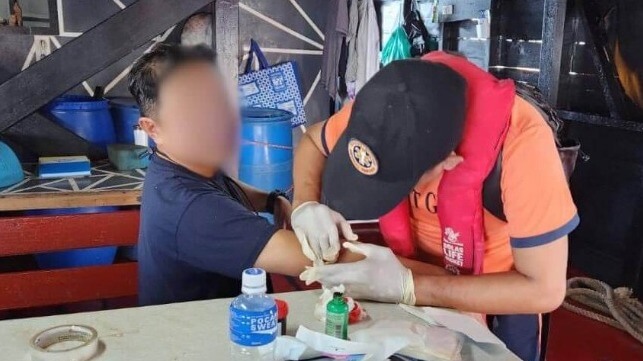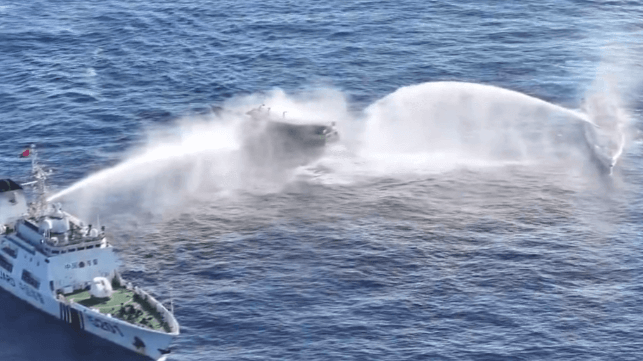WW3.0
Video: Chinese Water Cannon Breaks Bridge Windows on Philippine Boat

The Philippine armed forces have released more videos from yesterday's run-in between Philippine and Chinese vessels in the Spratly Islands, including footage of the moment when a Chinese water cannon shattered the bridge windows of a Philippine supply boat. Regional military commander Vice Admiral Alberto Carlos sustained minor hand injuries in the attack, according to Philippine outlet GMA 7.
The China Coast Guard's actions resulted in minor injuries and vessel damage, but did not rise to the level at which Manila would ask for military help from the United States, Philippine President Ferdinand Marcos Jr. said Wednesday.
"I do not think that it is a time or the reason to invoke the [U.S.] Mutual Defense Treaty. However, we continue to view with great alarm this continuing dangerous maneuvers and dangerous actions that are being done against our seamen, our coast guard,” Marcos said in an interview during a trip to Australia.
The U.S. State Department has reiterated that the treaty covers armed aggression at sea. “The United States reaffirms that Article IV of the 1951 US-Philippines Mutual Defense Treaty extends to armed attacks on Philippine armed forces, public vessels, or aircraft – including those of its Coast Guard – anywhere in the South China Sea,” a State Department spokesperson said in a statement Tuesday.
The location of the run-in is within the Philippine exclusive economic zone (EEZ), and the Chinese mainland lies some 700 nautical miles to the north. China believes that the vast majority of the South China Sea is Chinese, despite the 200-mile maximum boundary laid out by the UN Convention on the Law of the Sea. In 2016, the Permanent Court of Arbitration in the Hague ruled that China's claim to sovereignty over Philippine waters was inconsistent with international law, but Beijing has ignored the ruling.
"The responsibility for the incident lies completely with the Philippines," said Chinese foreign ministry spokeswoman Mao Ning at a press conference on Wednesday. "The so-called arbitral award on the South China Sea arbitration that the Philippines and a handful of countries regard as a benchmark goes against international law including UNCLOS and it is completely illegal, null and void."
China Coast Guard Injures Four With Water Cannon in S. China Sea Standoff

The Philippine Coast Guard has reported another "dangerous" run-in with the China Coast Guard at Second Thomas Shoal, a reef guarded by a Philippine military outpost. The encounter included two minor collisions and four injured personnel, according to the PCG.
On the morning of March 5, the Philippine Coast Guard began a regular resupply mission to the garrison on BRP Sierra Madre, the grounded WWII-era LST that serves as a base on the reef. As in past missions, the China Coast Guard (CCG) and Chinese maritime militia "harassed, blocked, deployed water cannons, and executed dangerous maneuvers" to stop the supply boats and interfere with the mission of the PCG.
At about 0630 hours in the morning, one of these maneuvers resulted in the collision of a China Coast Guard patrol boat and the PCG vessel MRRV 4407. The "minor collision" caused superficial damage to the hull of the MRRV.
At 815, another China Coast Guard vessel caused a minor collision with the supply boat Unaizah May 4 during an attempted blocking maneuver. At about the same time, two other CCG vessels used their water cannons on the Unaizah May, breaking the windows of the pilot house and injuring four people on board.
The injured personnel were treated on scene by the crew of MRRV 4407, and the mission command made the decision to turn Unaizah May 4 around due to the damage. The vessel retreated to a safe port on the main island of Palawan, escorted by the MRRV.
A video of the scene released by a pro-Philippine media organization appeared to show a China Coast Guard cutter making way astern at several knots while pursuing one of the supply vessels, an unorthodox approach to close-quarters maneuvering.
The second supply vessel made it through the Chinese cordon and delivered its goods successfully to the BRP Seirra Madre.
"Once again, China's latest unprovoked acts of coercion and dangerous maneuvers against a legitimate and routine Philippine rotation and resupply mission to Ayungin Shoal, have put the lives of our people at risk and caused actual injury to Filipinos on board UM4," said the PCG in a statement. "The systematic and consistent manner in which the People's Republic of China carries out these illegal and irresponsible actions puts into question the sincerity of its calls for peaceful dialogue and lessening of tensions."
The interaction occurred within the Philippine exclusive economic zone. China asserts that it has sovereignty over the area, along with most of the South China Sea, though its sweeping claims were ruled invalid by the Permanent Court of Arbitration in the Hague eight years ago.
The U.S. Embassy in Manila expressed solidarity with the Philippines and spoke out against the China Coast Guard's actions.
"We strongly condemn the PRC’s dangerous maneuvers at Ayungin/Second Thomas Shoal, which endangered lives, resulted in injuries, and damaged [Philippine Coast Guard] vessels in the EEZ. The U.S. stands with the Philippines and proponents of international law in support of a free and open Indo-Pacific," said U.S. Ambassador to Manila MaryKay Carlson in a statement.
No comments:
Post a Comment